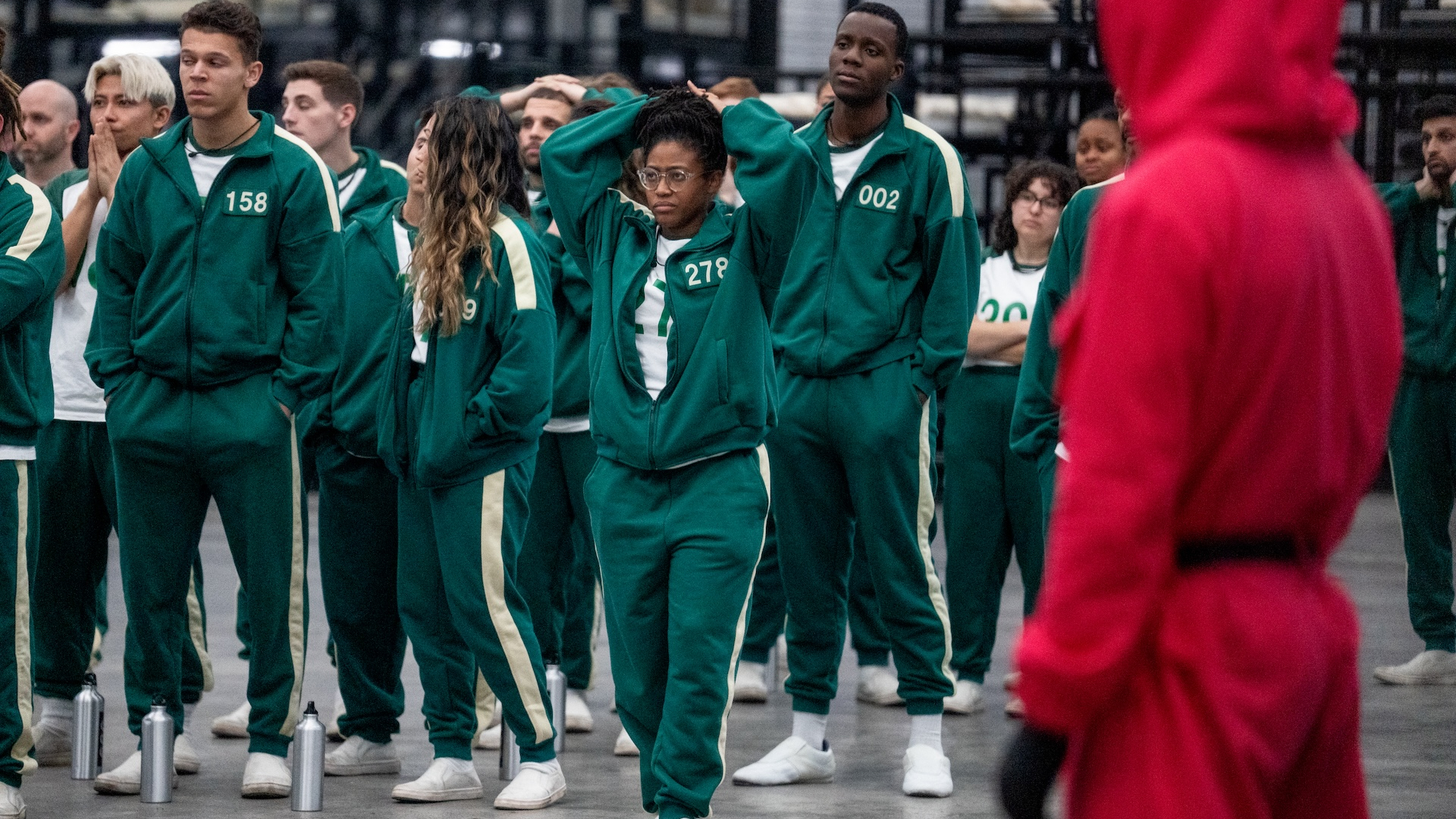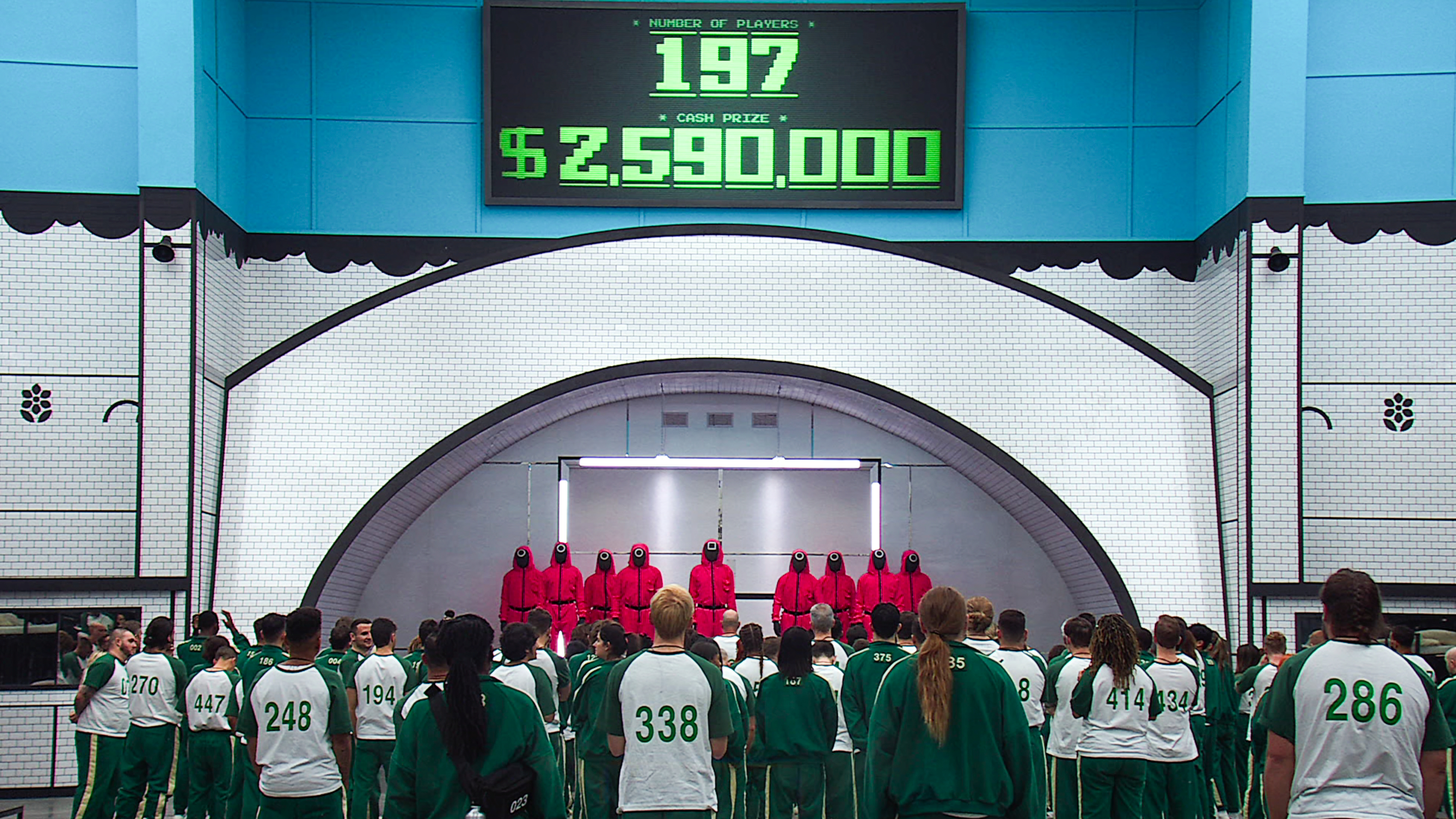'Squid Game: The Challenge' Is Reality TV at Its Voyeuristic, Dystopian Worst
Just because it’s can’t-turn-away television doesn’t mean it’s good.

Anyone who enjoyed watching Squid Game will likely devour Netflix's reality spin-off Squid Game: The Challenge. The reality series, which made its debut on the streamer on November 22 with the first of three weekly drops, is a Big Brother-style social competition that precisely recreates the premise from the hit K-drama, recreating the original's unsettling candy-colored sets, children's game-inspired challenges, and brutal (though in this case nonfatal) eliminations. As several reviews have pointed out (and as social media users clocked months ago upon seeing the show's trailer), Netflix's attempt to turn its most-watched show ever into an IP franchise strips away its central message as a horrifying fable on desperation under capitalism. Instead, Squid Game: The Challenge is the pure neutral evil of reality television: easy to binge, but soulless and devoid of any purpose or meaning.
Watching this reality show is a bleak experience, filled with the cognitive dissonance of seeing a hollow recreation of the drama created by people who didn't take its themes to heart. It's obvious from the first moments of the series that there were certain beats the reality show made to channel the original. The first "processing room" testimonial introduces a woman admitting that she's taking unpaid leave from work to be on the show, that she dreams of knowing what it's like to pay off her house. Minutes later, she's the first player out during Red Light, Green Light, followed by several others who fake draamatic "deaths" after an exploding ink pack signifies their elimination (instead of the original's bullets and blood). This short sequence is enough to demonstrate the most superficial interpretation of Squid Game's themes, and you can imagine some hypothetical producer in a control booth checking off a list. (In related news, an executive producer for the reality show told TV Guide that he believes "the anti-capitalist allegory is only one very small part of Squid Game.")
Any of the short supply of entertainment that comes with watching this show is found in either its unpredictability, as it inserts random mini-challenges and a new Battleship-style round between the iconic games, or its huge cast of characters. However, neither of those are strong enough to distract from the constant discomfort. Once you get past the initial shock of a new plot twist, each mini-challenge—which all happen in the dormitory and usually involve one player directly eliminating another—lacks any urgency as it reads as nothing more but a chance for producers to steer their designated main characters into the spotlight. Some of these cast members are genuinely charming, but most of them are either playing up their personalties to the point it'll make you wince, or they're flattened into stereotypes within their limited screen time. Not to mention, the show isn't afraid to let its instant stars get eliminated, which could be a smart choice if it didn't leave viewers with no connection to the remaining players once the ones they've spent time hating or loving are gone.

Even though Squid Game: The Challenge is a very jarring watch for fans who fully processed the themes of the original drama, it's still likely to find its own fanbase. It still has the trappings of every streaming-era reality hit: cliffhangers designed to keep viewers pressing the "Continue Watching" button, constant mind games that allow watchers to yell what they think players should do at the TV. When you can argue that half of reality TV's ratings nowadays come from hate-watching, a show like this is an easy greenlight for studios. It's also maybe a perfect case study for Hollywood's current capitalistic instincts.
It's telling that this series is arriving at a time where the vast chasm of differing opinion between the decision-makers running Hollywood and the practitioners who make up the industry—from writers and actors to critics and a large slice of super-fans—is more visible than ever. We're just coming off a series of strikes where the day-to-day workers that keep productions running went directly up against the studio and streaming executives on issues including IP rights. While the WGA strike ended in a favorable deal for the union, overseas filmmakers are still vulnerable to getting cut out of major deals. (Last June, LA Times reported that while Squid Game increased the value of Netflix by an estimated $900 million, creator Hwang Dong-hyuk received no residuals following the release of the show.)
The viewers who aren't thinking about Squid Game: The Challenge beyond it being an interesting new reality competition concept, or the closest thing we'll get to a Squid Game season 2 for several more months, or a mindless binge to keep on in the background of some other activity, will probably make the new reality show another ratings hit for Netflix. These viewers, like the hypothetical streaming execs who only care about merch opportunities and hours viewed, aren't looking for some big answers to societal ills out of their latest Netflix binge. That brain-off viewing is what made the streamer so successful, and at the right time, with the right content, it can be essential for staying sane as the world seems to fall apart. But a show like Squid Game, which was made to point out some of the ways society is set up to fail its most vulnerable, shouldn't be turned into a mindless IP grab. The flattening of its themes, via reality shows and interactive games that turn a moral fable into a simple game, make it harder for the meaning at the heart of the story to come through. If given the chance of which to watch, the original Squid Game is much better than this empty Challenge.
Get exclusive access to fashion and beauty trends, hot-off-the-press celebrity news, and more.
Quinci LeGardye is a Culture Writer at Marie Claire. She currently lives in her hometown of Los Angeles after periods living in NYC and Albuquerque, where she earned a Bachelor’s degree in English and Psychology from The University of New Mexico. In 2021, she joined Marie Claire as a contributor, becoming a full-time writer for the brand in 2024. She contributes day-to-day-content covering television, movies, books, and pop culture in general. She has also written features, profiles, recaps, personal essays, and cultural criticism for outlets including Harper’s Bazaar, Elle, HuffPost, Teen Vogue, Vulture, The A.V. Club, Catapult, and others. When she isn't writing or checking Twitter way too often, you can find her watching the latest K-drama, or giving a concert performance in her car.